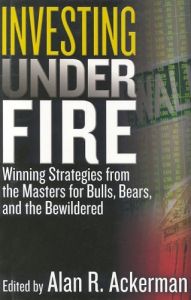Join getAbstract to access the summary!

Join getAbstract to access the summary!
Alan R. Ackerman
Investing Under Fire
Winning Strategies from the Masters for Bulls, Bears and the Bewildered
Bloomberg Press, 2003
What's inside?
Even investment experts need a crystal ball to guess the impact international and local issues have on stock earnings.
Recommendation
Investing Under Fire is a very interesting collection of essays by 30 luminaries from various fields, some of them not at all related to investing. Each selection contains at least a thought or two to repay the effort of perusal, and that’s a great deal more than many books deliver, especially books about investing. The anthology’s five segments cover mutual funds, key sectors - from Asia to precious metals, research and legal resources, innovative companies and geopolitical influences. Anyone who merely reads the first selection, by Vanguard founder John Bogle, and applies its lessons, would more than recapture the purchase price of the book. Despite the sometimes self-promotional comments from a few of the other contributors, it’s a very valuable book. If nothing else, getAbstract.com notes, it will expose you to a spectrum of diverse opinions, a useful prophylactic against complacency.
Summary
About the Author
Editor Alan R. Ackerman is a market commentator. An expert in foreign affairs and international strategies, he has been a contributing editor to financial publications and appears weekly on television and radio.
















Comment on this summary